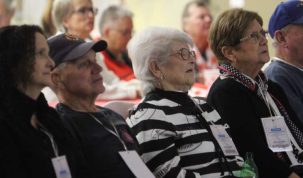By Cecilia Nasmith/Today’s Northumberland
Patio season in Cobourg is March through October and, anticipating that, the Accessibility Advisory Committee has asked council to approve their recommendation before it all gets under way.
At the March meeting of Cobourg council’s Community Services, Protection and Economic Development Committee, members accepted the recommendation for information purposes – to ensure that anyone with vision or mobility disabilities can be assured that they can navigate through patio areas safely.
“Sometimes it’s not the patios that are put in place,” Municipal Clerk Brent Larmer told the committee.
“It may have to do with the sandwich-board signs they sometimes place out, and some merchandise as well.”
The applicable bylaws and design regulations were included in the information presented, and Larmer explained that, while patios were always permitted with certain criteria, their popularity boomed during the COVID-19 pandemic when public health regulations limited or sometimes forbade indoor occupation of restaurants.
Amendments to the Liquor License Act gave municipalities greater authority on the temporary patio extensions that sprang up as a measure to keep these businesses viable. As a result, the town is an active partner in helping businesses plan these operations, ensuring they know what is expected. And once they are open, bylaw officials conduct regular inspections to ensure compliance – and also respond when complaints come in.
The unique challenge with King Street patios is that there is already a significant number of street features in place – lampposts, garbage receptacles, benches – that must be taken into account by anyone wanting to set up a patio and still leave the accessible pathway for pedestrians with special challenges.
Collaboration with the town is so important here, Larmer said.
“We really work to try to do what the government intended – reduce the red tape, and still keep our residents safe.
“As a result of this recommendation, we realize maybe there’s a heightened concern about accessible pathways, and a letter will go out to businesses to remind them.”
Committee member Lucas Cleveland pointed out that this is one side of the coin.
“Does this not possibly prevent some businesses from exercising their ability to create more profitability and, as such, how do we as a council navigate this decision when we have to balance two different interests?” Cleveland asked.
“I think that’s the uniqueness of our staff and the process we have created to work as much as we can with businesses when they submit the application,” Larmer responded.
“I don’t think there’s a correct answer – it’s just sort of something I wanted to put on the record,” Cleveland commented.
Fellow committee member Adam Bureau agreed that it’s hard to strike that delicate balance between profitability and public safety in a patio project – “between commercial and residential, and promoting a business and promoting public safety of the residents.
“But we do have to follow AODA standards,” he added, referring to the Accessibility for Ontarians with Disabilities Act.
Bureau also pointed out that, aside from take-out services, patios were the only real option for restaurants during COVID-19. Now that indoor seating is no longer an issue, profitability should not be the desperate concern it was before.
“That’s gone now, and we have to get back to the safety of our residents,” he argued.
“We just want to make sure everyone can navigate safely, and no one runs into a tree or has to step out into the middle of the road,” committee chair Aaron Burchat added.
Director of Planning Anne Taylor Scott pointed out that the town has a specially designated patio committee to review applications, and it has representation from a wide range of disciplines, including building, fire, planning, accessibility and bylaw enforcement.
Furthermore, she noted, anyone contemplating a patio operation would typically investigate the option in advance to determine what was required and if it could be profitable.
“We are making our best efforts to make sure we are supporting those businesses and optimizing their use as effectively as we can.”
Having accepted the recommendation for information purposes, the committee will refer it to council for approval at their meeting on March 27.






















